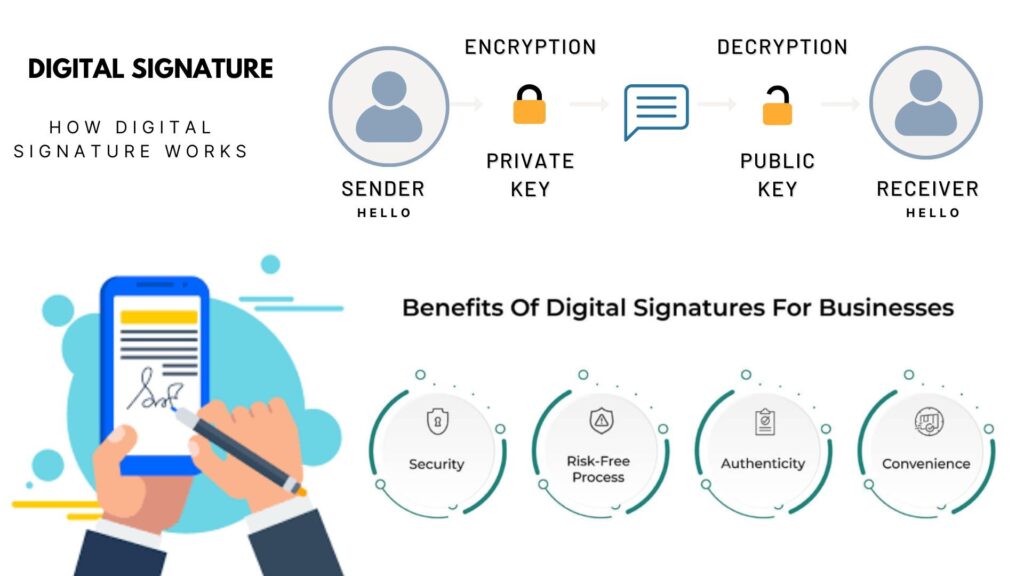
Benefits of ERP SystemsWhat is a Digital Signature & Benefits of Digital Signatures.Benefits of ERP Systems
What is a Digital Signature?
A digital signature is a type of electronic signature that uses cryptographic techniques and signature keys that are uniquely associated with the signatory. To create these signatures, digital signatures utilize public key encryption methods. This technology ensures that electronic documents, transactions, and digital communications are securely authenticated, providing documentation of source, identification, and status. Digital signatures can also be used to accept informed consent from signers, making them a versatile tool for a variety of business applications.
The Benefits of Digital Signatures: Transforming Business in the Digital Age
In today’s increasingly digital business landscape, efficiency, security, and reliability are critical. Digital signatures are an innovation that addresses these needs, seamlessly integrating into modern business operations. Here are the key benefits of adopting digital signatures:
1. Enhanced Security
Digital signatures offer robust security features by using encryption technology to secure documents and verify the authenticity of signatories. This ensures that the document remains unaltered after signing, providing greater security compared to traditional signatures. The cryptographic basis of digital signatures protects against forgery and tampering, offering businesses and their client peace of mind.
2. Improved Efficiency and Time Savings
Digital signatures streamline the signing process, eliminating the need for physical document handling, such as mailing, faxing, or courier services. Documents can be signed and returned within minutes, regardless of the signatories’ locations. This rapid turnaround is especially beneficial for time-sensitive contracts and agreements, significantly speeding up workflows and enhancing overall efficiency.
3. Cost Reduction
Adopting digital signatures can lead to substantial cost savings by reducing the need for paper, printing, postage, and physical storage. Additionally, the reduced turnaround time facilitates quicker project completions and faster revenue cycles, further improving financial performance.
4. Environmental Benefits
Switching to digital signatures supports sustainable business practices by minimizing paper usage and reducing the carbon footprint associated with printing, mailing, and storing physical documents. This eco-friendly approach aligns with corporate social responsibility goals and appeals to environmentally conscious clients and stakeholders.
5. Legal Validity and Compliance
Digital signatures are legally binding and recognized under various international laws and regulations, such as the eIDAS regulation in the European Union and the ESIGN Act in the United States. They provide the same legal standing as traditional signatures, ensuring that digitally signed documents are admissible in court. Furthermore, digital signatures help businesses comply with industry-specific regulations by providing an audit trail and maintaining document integrity.
6. Enhanced Customer Experience
Incorporating digital signatures into business processes enhances the customer experience by offering a convenient and user-friendly way to sign documents. Clients can sign agreements from anywhere, at any time, using their preferred device. This flexibility and convenience can lead to higher customer satisfaction and improved business relationships.
7. Streamlined Document Management
Digital signatures facilitate better document management by enabling easy storage, retrieval, and organization of signed documents. Electronic documents can be stored in secure digital repositories, reducing the risk of loss or damage associated with physical documents. Additionally, digital signatures often include metadata, such as timestamps and signatory information, simplifying record-keeping and audit processes.
Conclusion
Integrating digital signatures into business operations offers numerous benefits, from enhanced security and efficiency to cost savings and environmental sustainability. As the business landscape continues to evolve, embracing digital signatures is not just a technological upgrade but a strategic move towards more agile, secure, and customer-centric operations. By leveraging the power of digital signatures, businesses can unlock new levels of productivity and innovation, positioning themselves for success in the digital age.